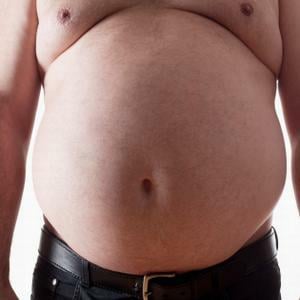
Visceral, or deep belly, obesity is a risk factor for bone loss and decreased bone strength in men, according to a study presented today at the annual meeting of the Radiological Society of North America (RSNA).
"It is important for men to be aware that excess belly fat is not only a risk factor for heart disease and diabetes, it is also a risk factor for bone loss," said Miriam Bredella, MD, radiologist at Massachusetts General Hospital and associate professor of radiology at Harvard Medical School in Boston.
According to the National Center for Health Statistics, more than 37 million American men over age 20 are obese. Obesity is associated with many health problems, including cardiovascular diseases, diabetes, high cholesterol, asthma, sleep apnea and joint diseases. Yet despite all the health issues, it was commonly accepted that men with increased body weight were at lower risk for bone loss.
"Most studies on osteoporosis have focused on women. Men were thought to be relatively protected against bone loss, especially obese men," Dr Bredella said.
But not all body fat is the same. Subcutaneous fat lies just below the skin, and visceral or intra-abdominal fat is located deep under the muscle tissue in the abdominal cavity. Genetics, diet and exercise are all contributors to the level of visceral fat that is stored in the body. Excess visceral fat is considered particularly dangerous, because in previous studies it has been associated with increased risk for heart disease.
Osteoporosis on the increase among South African men, too
Professor Stephen Hough, IOF Board member and President of the National Osteoporosis Foundation of South Africa, said “Osteoporosis is often viewed as a woman’s disease, and therefore the general public and even doctors fail to recognize just how common and serious osteoporosis is in older men.”
In South Africa there are currently there are only about 8 million people over the age of 50 – the ageing population will therefore exponentially increase in the next decade or two and so will the occurrence of osteoporosis and osteoporotic fractures. Anti-retroviral therapy use has increased dramatically and the negative influence of these medications on bone health is known and being studied, also locally.
Experts are also concerned that factors such as smoking, sedentary lifestyle, alcohol abuse and low levels of calcium and vitamin D intake may be contributing to poor bone health in South African men. Previous studies have also found an excessive salt and protein intake, coupled with high alcohol use to be some of the main contributing risk factors in South African men.
Read: Men get osteoporosis too
How the study was done
After the Osteoporotic Fractures in Men Study - a multi-center observational study designed to determine risk factors for osteoporosis - indicated that male obesity was associated with fracture risk, the researchers wanted to quantify belly fat and study its impact on bone strength.
Dr Bredella and her team evaluated 35 obese men with a mean age of 34 and a mean body mass index (BMI) of 36.5. The men underwent CT of the abdomen and thigh to assess fat and muscle mass, as well as very high resolution CT of the forearm and a technique called finite element analysis (FEA), in order to assess bone strength and predict fracture risk.
"FEA is a technique that is frequently used in mechanical engineering to determine the strength of materials for the design of bridges or airplanes, among other things," Dr Bredella said. "FEA can determine where a structure will bend or break and the amount of force necessary to make the material break. We can now use FEA to determine the strength or force necessary to make a bone break."
In the study, the FEA analysis showed that men with higher visceral and total abdominal fat had lower failure load and stiffness, two measures of bone strength, compared to those with less visceral and abdominal fat. There was no association found between age or total BMI and bone mechanical properties.
"We were not surprised by our results that abdominal and visceral fat are detrimental to bone strength in obese men," Dr Bredella said. "We were, however, surprised that obese men with a lot of visceral fat had significantly decreased bone strength compared to obese men with low visceral fat but similar BMI." The results also showed that muscle mass was positively associated with bone strength.
Read more:
Obesity can cost you more than your health
Urbanisation, cultural beliefs fuel obesity




 Publications
Publications
 Partners
Partners










